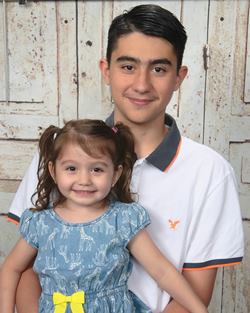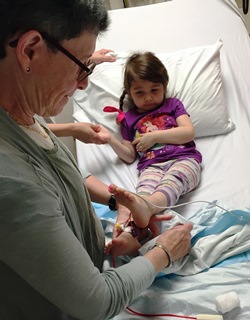Usted está aquí
After Treatment with her Own Cord Blood, Toddler is Able to Speak

Isabella is three-and-a-half years old, but just weeks ago, she said her brother's name for the first time. Her older brother, Matthew, 15, was diagnosed as a child with the same condition that she has: Childhood Apraxia Syndrome (CAS), which is a motor speech disorder. CAS results in problems saying sounds, syllables, and words because the brain has difficulty in planning to move the body parts that form speech, such as the lips, jaw, and tongue.
Isabella's parents, Steven and Rosa, are small business owners in Queens, New York, running a technology education business for children, iplaytek. Before Isabelle was born, they were considering the possibility of banking stem cells, thinking it may benefit their son. "We discovered that the amount of (cord) blood collected is often only enough for a young child," said Steven Barney.
They ultimately decided to bank Isabella's cord blood with Americord Registry, a private cord blood, cord tissue, and placenta tissue banking company. "We researched the cord blood transfusions being done at Duke University for Apraxia, and they had found some success. We had some initial hesitation, but you never know what the future holds."
The Barney family traveled to Duke University where Americord's affiliate laboratory, Cook General Biotechnology, had shipped Isabella's stem cells in a cryopreservation tank. These tanks are kept at below -190 degrees Celsius, so that the cells within remain frozen during their journey from the lab to the treatment center.

"The process took less than ten minutes," said Barney. "Once the transfusion was finished, Isabella remained on fluids for a couple of hours. We then just hoped for the best!" Isabella returned home to Queens, New York after a couple days.
Within 3 weeks, her speech improved noticeably. "She could never say her brother's name, Matthew," said Barney. "She would try but you could never understand. Each letter was difficult for her. Now, she can say his name clearly! She even said the other day, 'I want to stay home with Matthew!'"
Isabella's speech continues to improve with each passing week, resulting in higher daily word usage and her ability to at last make herself understood. "My daughter was speaking around 1-2 words per day before this transfusion," said Barney. "She would get mad because we could not understand her. Now, she is able to say new words and tries to repeat our words. She can count to ten! She has always been bright, it was only a lack of speech holding her back."
Banking cord blood means saving stem cells from the umbilical cord blood that are a genetic match to the child. Parents can choose to bank either privately or publicly.
Public banking is often referred to as donating, because the stem cells are entered anonymously into a registry based on genetic markers and available to anyone who may need a transfusion.
Private cord blood banking means saving stem cells for a family's exclusive use. Steven and Rosa were able to preserve Isabelle's stem cells immediately after birth and save them with Americord, a private cord blood bank, exclusively for her use in the future. So when they made the decision to provide Isabella with a cord blood transfusion, Americord Registry shipped Isabella's stem cells to her treatment center free of charge.
"Cord blood banking provides peace of mind," said Barney. "It's like buying a winning lottery ticket that you hope you never have to cash in. But if we hadn't stored our angel's stem cells, none of this would have been possible."
![]()


